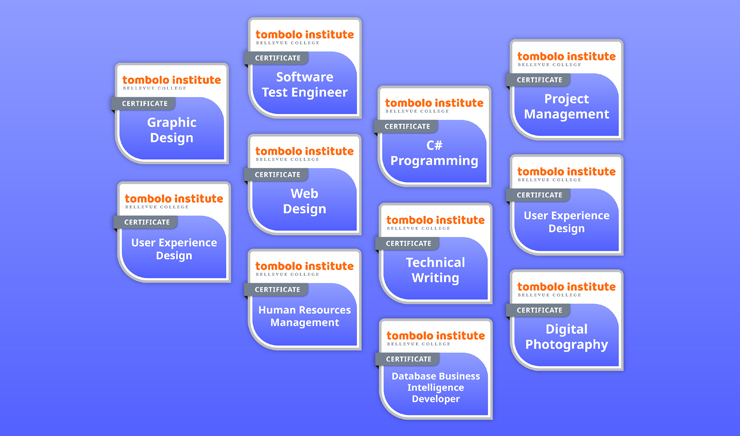Blog
Profiles in Project Management: Instructor Dolores Gill, Ph.D.

5/25/2021
Tombolo Institute Certificate Program Deep Dive with Dolores Gill, Ph.D.
Tombolo Institute instructor Dolores Gill, Ph.D., tells her students, “To be a rock star project manager, you have to think in circles, triangles and boxes; straight lines, curvy lines.” Her career has covered a vast terrain: She has experience in fashion, production, manufacturing, prototyping and telecommunications. She’s also worked for nonprofits such as the United Way. In the political realm, she has worked for two Washington state governors and with former President Bill Clinton. It is hard to imagine a project she has not managed.
Gill brings this vast experience along with incredible energy to the classroom at Tombolo Institute, where she teaches in the Project Management Certificate Program. In this article, she talks about the goals of the program and how it can help students become creative, proficient and indispensable project managers.
How does the certificate program at Tombolo Institute help students become excellent project managers?
The goal of the certificate program is to teach people how to become top-notch project managers. It’s not about merely preparing students to take the PMP® (Project Management Professional) exam. Our certification program is designed to make people better project initiators, designers, planners, controllers and monitors. My goal is that once they come out of Bellevue College, they are really good hands-on project managers. That’s what we’re looking to do.
That’s why I push different types of thought processes. I give my students many real-life examples so they can take specific things they’ve learned in class and apply that knowledge in the workplace, to correct the course of a project they are working on. In today’s demanding workplace, people in many different types of positions are expected to take an idea and turn it into an executable project plan. Our students bring those experiences to the classroom. They tell me, “This is what’s going on at my company. I’ve got this kind of a boss. I’ve got this kind of process, and it’s not going smoothly.” After getting a clear picture of what they are doing, I suggest what the stumbling blocks may be. I’ll tell them to go back and put this process in place or use this tool, and you’ll have a much better outcome. Most times, they’ll come back to class and say, “That really worked,” or, “I tried it and had a partial success.” I try to bring a consultative element to what I teach. With each class, I see my students improving at some aspect of managing projects.
Hear a testimonial from one of our project management certificate graduates:
Is peer-to-peer collaboration encouraged in the classroom?
Yes. For example, I will occasionally throw a question from a student back to the class and say, “What do you all think about this problem?” Then, suddenly, you have 15 or 20 minds working and collaborating with the student who described a problem. They discuss the situations and work out solutions. I insist on making my classroom a safe, private space for them to experiment and think things out. That is how learning is enhanced and how people grow intellectually. That is how we get better at what we do, that is how we build confidence and how we feel successful at our work. We’re not on our own. We don’t live in a world of isolation. We still need other people and teams. We need to do more in the classroom to teach people how to be better teammates, collaborators and communicators.
I like to tell my students that project management is the ultimate team sport. You may have anywhere from 20 to 1,000 people on a project. Therefore, you have to constantly remind yourself that everyone is playing on the same team. I tell them that if you don’t succeed at fostering cooperation, teamwork and communication, it doesn’t matter how good your Excel spreadsheets are. That’s what we strive for in the project management classes at Tombolo Institute.
Tombolo Institute is a Project Management Institute–registered education provider. What value does that bring to students in the certificate program?
Employers want to know that whatever certification their employees attain, it was issued by a recognized entity. The program at Tombolo is based on the Project Management Body of Knowledge (PMBOK Guide®) that, combined with the fact that our Project Management Certificate Program was developed by industry experts to provide real-world, hands-on instruction, gives hiring managers the assurance that our students are job-ready, that they know how to step into the role and make immediate contributions. This is important because the project manager’s role is critical in almost every organization and industry.
Describe the breadth of knowledge and skills students will acquire in the certificate program.
We start out teaching students what we call the theory, which is part of the curriculum that is aligned with the PMBOK® Guide. There are three main core classes that focus on theory. We go through the processes and the stages of project management. We cover the background and evolution of project management and how to use the tools that are essential for the role.
We have five other classes that are based on practice in which students learn things like requirements, how to run a team, how to communicate with a team. The last class in the program is the practicum, which I think is our standout course. For the practicum, we get students a real-life client to work with. This requires students to apply everything they’ve learned from the first eight classes. The practicum is where it all comes together. On the first day, students meet with the instructor and get to know each other. Then we present the scope of the client’s project. Next, they meet with the client, after which they develop a project management plan. On the last day of class, they present the complete project to the client.
In the process of working on the practicum, students get something of incredible value. They each get to be a real project manager for a week. Students take on all the roles a project manager plays in the life cycle of a project. It’s an amazing experience for the students. They learn how to develop the product in the project and deliver it. They also learn how to interact and communicate effectively as a project manager, because during the entire process, they are getting real-life feedback from the instructor.
In a typical class, what is the mix of experience your students bring? From which industries do they come?
I’ve had people from the legal profession who have realized that they want to be better project managers. I’ve had people from Boeing, Microsoft, Costco, Liberty Mutual and PEMCO Insurance. It seems almost every industry in our region has been represented in our classes. Additionally, we have people from small- and medium-sized companies. Anyone who is responsible for managing complex projects will benefit from the certificate program. Those projects could be anything from launching a new product to managing a conference to producing a rock concert.
Hear more from Dolores Gill, here.
###
Learn more about the Project Management Certificate Program at Tombolo Institute.



